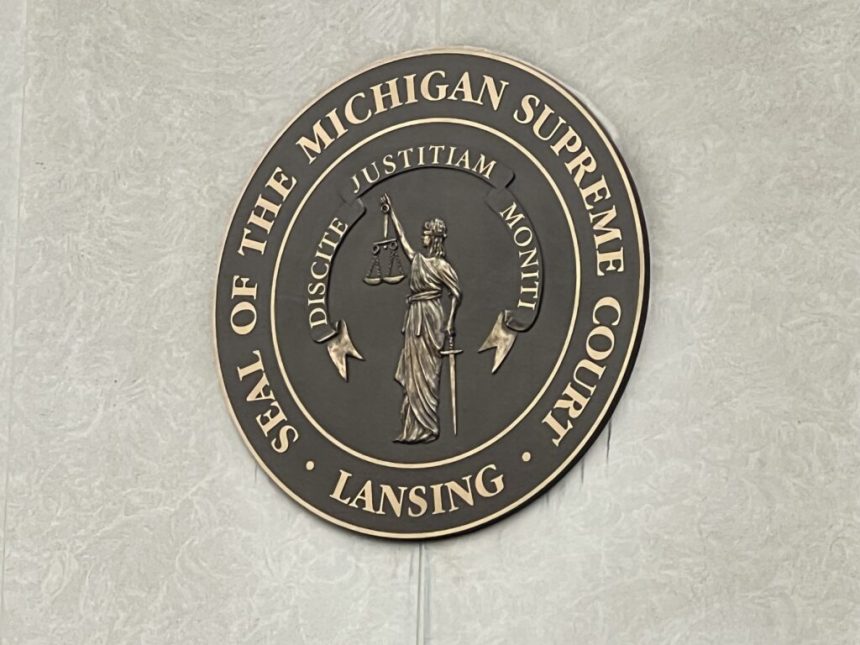Seal of the Michigan Supreme Court | Photo by Jon King
The Michigan Supreme Court approved last week a change to Canon 3 of the Michigan Code of Judicial Conduct that would prevent judges from “intentionally or recklessly” allowing any bias, prejudice or harassment into their judicial actions and duties.
This is a change from previous language, which required “fair, courteous, and respectful treatment” from Michigan judges. The order came seven months after the rule was initially put forward by the court for public comment, and did not include any concurring or dissenting opinions.
The final rule is less specific than the initially proposed version, which included a long list of protected characteristics: “race, color, sex, gender identity or expression, religion, national origin, ethnicity, disability, age, height, weight, sexual orientation, marital status, familial status, socioeconomic status, [and] political affiliation.” It is based on the American Bar Association’s Model Rule 2.3 — these model rules are designed to provide guidance to judges and lawyers around the country.
The proposed rule change, which had been paired with another proposal to change attorney conduct rules to similarly include anti-bias and anti-harassment rules against specific protected classes, drew strong criticism during its open comment period, especially from Christian and Catholic legal groups that took issue with language that would require both judges and attorneys to respect LGBTQ+ identities.
The Catholic Lawyers Society of Metropolitan Detroit, for example, criticized the requirement in the rule to align with “gender ideology [that] is incompatible with the Catholic faith.”
But some groups, like Citizens for Racial Equity in Washtenaw, expressed strong support for the rules, writing, “These amendments represent critical steps toward creating a more equitable judicial system by explicitly prohibiting bias, prejudice, and harassment based on protected characteristics.”
The attorney conduct rules were not included in this final decision by the Supreme Court, with those changes to the Michigan Rules of Professional Conduct being “held for further consideration by the Court,” the order notes. Those are based on the American Bar Association’s Model Rule 8.4(g), which has garnered controversy in the legal profession, especially in conservative legal spaces.
Many of the comments submitted in opposition to the changes noted potential First Amendment issues with the proposal, with a number singling out the attorney conduct rules that have yet to be decided on. The Christian Legal Society argued that it would impose a “speech code” on lawyers, while the Diocese of Lansing wrote that it would “impermissibly regulate speech and infringe the free exercise of religion.”
“These amendments represent critical steps toward creating a more equitable judicial system by explicitly prohibiting bias, prejudice, and harassment based on protected characteristics.”
– Citizens for Racial Equity in Washtenaw
And it’s not just Christian groups expressing concerns — the Council on American-Islamic Relations Michigan wrote that the proposal was “threatening to discipline judges and attorneys who express or act upon sincerely held religious beliefs.”
According to Lambda Legal, an LGBTQ+ legal advocacy organization, Michigan had previously been one of just three states without any specific bias or harassment language in its judicial code of conduct, along with Alabama and North Carolina. It will now join Arkansas, Louisiana, and Virginia as the four states that have only general anti-bias language without any reference to specific groups.
OUTreach, a student-led pro bono law project at the University of Michigan Law School centered on the LGBTQ+ community, also submitted a comment in favor of the changes.
“By accepting the outlined changes, Michigan will put itself on the right track towards fulfilling its commitment to all its citizens,” the group wrote. “While the proposed rules are slightly more expansive, they indicate the Court’s commitment to equitable justice for all people and the evolving standards of respect within our society.”
Justice Brian Zahra, the only GOP- nominated justice on the court, would have declined to publish the proposal for comment at all, the initial proposal notes.
It marks the second change to judicial conduct rules in Michigan focused on inclusivity, after a 2023 order from the Supreme Court required judges to address defendants, litigants, attorneys and others in court by the pronouns and salutation that they select.
That change also provoked backlash, especially from conservative and Christian groups.
SUBSCRIBE: GET THE MORNING HEADLINES DELIVERED TO YOUR INBOX









